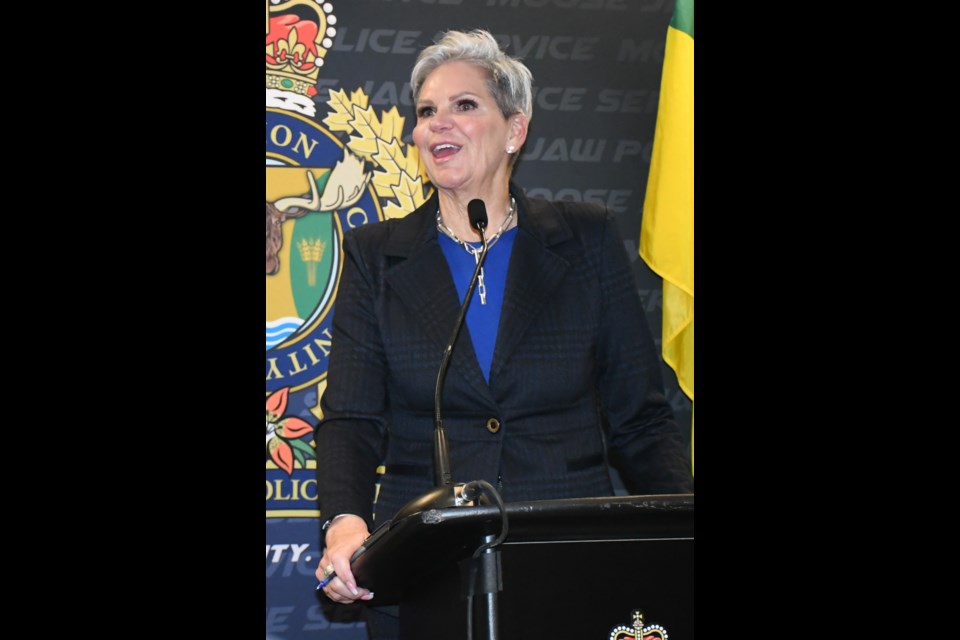Over 30 per cent of women will experience a sexual assault in their lifetime, but only six per cent will report it to police and just one per cent of complaints will lead to a conviction.
Those statistics are sobering, but the Government of Saskatchewan hopes new funding will better address the situation.
During a news conference at Moose Jaw Police Service headquarters on March 20, Christine Tell, minister of corrections, policing and public safety, announced that the Victim Advocate Case Review (VACR) program would expand to Moose Jaw, Prince Albert and their surrounding areas.
Such programs allow community experts to collaborate with police agencies on closed sexual assault files to identify opportunities to improve investigation outcomes for cases that police deemed unfounded.
VACR partnerships can increase transparency and improve how police investigate sexual assaults, possibly leading to a higher likelihood of offenders being convicted, the province says. The program can also create systemic changes by improving trauma-informed approaches for victims.
The province is dedicating $92,000 for VACR partnerships in 2022-23, an increase of nearly $25,000 from last year to cover expanding the program to Moose Jaw and P.A.
The Moose Jaw Police Service (MJPS), Moose Jaw Transition House and Regina and Area Sexual Assault Centre (RASAC) will jointly deliver the program. Three employees each from transition house and RASAC will work at police headquarters to review files that were closed or deemed unfounded.
RASAC began reviewing those files at police HQ last November. The partners will continue to review all such files quarterly.
The province also said it would contribute $164,000 for transportation initiatives to support individuals and families leaving interpersonal violence and abuse or needing a sexual assault forensic examination.
“The dynamics involved in a sexual assault and personal violence are indeed many and (are) very complicated,” said Minister Tell. “… We want to get at that (low reporting rates). We want to figure out exactly what’s going on so we can be successful (not only) for the survivor but also for the community.”
The province is concerned about the statistics around this issue, which is why it relies on knowledgeable community-based organizations to deliver the program, she added.
“In policing, we always want to do the right things … but sometimes, how to do them isn’t entirely clear,” said Police Chief Rick Bourassa.
“So it was really brought to our attention a number of years ago that we were not doing a good job in serving people who had been victimized by sexual violence,” he continued. “And we knew that we had to get better. Part of that is the (VACR), which is so welcome that we’ve wanted to have here for some time.”
This program is another step the agency can take to provide quality service that people expect and deserve, Bourassa added.
This announcement is exciting because Regina and Saskatoon had great success during their pilot projects in 2021, while sexual assault investigations should improve with the addition of Moose Jaw and Prince Albert, said Jenn Angus, executive director of Moose Jaw Transition House.
The transition house deals with all forms of violence — such as physical, mental, emotional, sexual and financial — so it is leaning heavily on RASAC to learn everything it can to best support victims, she continued.
“The more that women and victims of sexual violence can feel heard and respected in their trauma, the more likely it is that others will come forward in the future,” Angus added.
RASAC has worked with the Regina Police Service for several years and reviewed over 300 sexual assault cases, said executive director Lisa Miller. Those experts have offered feedback on developing a comprehensive sexual assault investigative policy and delivered training to police and Crown prosecutors.
“The statistics around sexual violence in Saskatchewan are pretty staggering. … the long-term impacts are significant, and whether we want to acknowledge it or not, tend to be the root cause of some of the most challenging social issues we have in this province,” she continued.
Reporting rates and convictions are low because of the “shame and blame” with this issue and the intimate nature of the crime, Miller added. However, advocates have worked for decades to make changes to the criminal justice system so women feel comfortable reporting their assaults.




